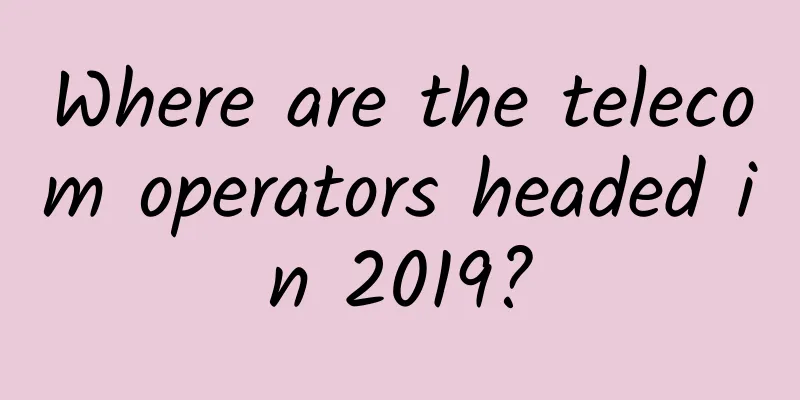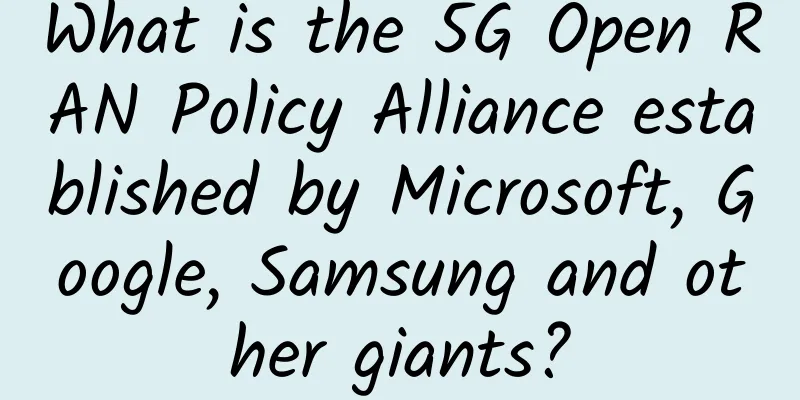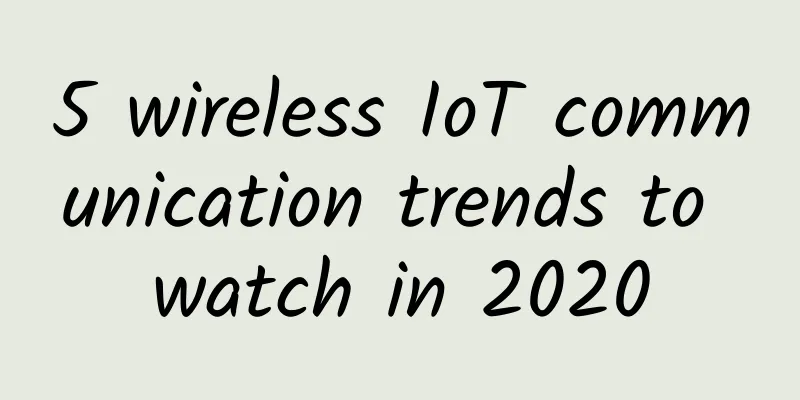Where are the telecom operators headed in 2019?

|
Change leads to smooth flow, while no change leads to obstruction; Change brings prosperity, while no change brings decline; Change means life, no change means death! 1. Current Status and Social Background of the Communications Industry Recently, the Central Economic Work Conference proposed to accelerate the pace of 5G commercialization and strengthen the construction of new infrastructure such as artificial intelligence, industrial Internet, and Internet of Things. 5G commercialization has been put on the national agenda. According to the "Economic Operation of the Communications Industry in October 2018" released by the Ministry of Industry and Information Technology, from January to October 2018, the total volume of telecommunications business nationwide was 5065.9 billion yuan, a year-on-year increase of 139.8%, and the growth rate in October reached 139.5%; the cumulative telecommunications business revenue was 1094.8 billion yuan, a year-on-year increase of 2.7%, and the growth rate fell by 0.3 percentage points compared with the first three quarters. The total volume of telecommunications business maintained high growth, while the revenue growth rate continued to decline. As the underlying carrier of the information industry, the communications industry, after enjoying the prosperity of the demographic dividend and the popularization of mobile smartphones, is facing the strong consumption demand for information services and explosive bandwidth demand from end users, and its development prospects are worrying, mainly in the following aspects:
How the telecommunications industry can maintain its competitiveness in the future, thereby effectively supporting the digitalization process of other industries in society and forming a positive cycle of the digital economy requires the entire telecommunications industry to think and act together. "Change leads to success, while stability leads to obstruction; change leads to prosperity, while stability leads to decline; change leads to survival, while stability leads to extinction." For the communications industry, which is at a bottleneck in its development, transformation and reform are the only way forward. 2. Four strategic heights of the communications industry in 2019 1. Seize the new opportunities of 5G and deepen the toB market On December 6, 2018, the three major operators obtained nationwide 5G low- and medium-band test frequency use licenses, and the 5G commercial journey of communication operators has taken a step forward. The technical characteristics of 5G determine that 5G applications will be deeply integrated with the real industry. 5G will play a vital role in improving total factor productivity, promoting the networking, digitalization, and intelligent development of all walks of life, and accelerating the release of new network facilities construction needs and vertical industry information service needs. The 5G era may become an important watershed in the telecommunications market. "Whoever can better grasp the 5G market can achieve more sustainable and high-quality development." At the same time, as emerging technologies such as AI, big data, and blockchain in the "post-Internet era" mature day by day, consumer-level networks gradually cover the entire population, and the demographic dividend of the C-end communication market is exhausted. At the same time, China has a large number of corporate users. The number of companies registered with the Industrial and Commercial Administration in China has reached nearly 30 million, exceeding the overall number of the United States, and small and medium-sized enterprises are ideal customers for to B platforms. From the perspective of policy orientation, the country has also realized that the current Internet economy is adjusting from the consumer Internet to the industrial Internet structure. Using technology to improve service efficiency and liberate productivity is the ultimate goal of the B2B market and the main goal of administrative services. Spokespersons of the three major operators all attached great importance to 5G commercialization and toB market layout in their public speeches:
(1) China Mobile From December 6 to 8, 2018, the 2018 China Mobile Global Partner Conference was held in Guangzhou. The theme of this conference was "5G connects the new era". China Mobile Chairman Shang Bing delivered a keynote speech entitled "Building a 5G Industry Ecosystem Together, Connecting a Better Future". In the speech, he mentioned that in the face of the new trend of accelerated 5G development and industrial transformation, China Mobile will take a more open attitude, follow the trend and act accordingly, and continue to deepen the implementation of the "Big Connection" strategy. With the goal of "5G pre-commercialization in 2019 and large-scale commercialization in 2020", we will actively implement the 5G Network Navigator Plan, fully launch the construction of 5G large-scale test networks, and actively promote 2.6GHz and 4.9GHz 5G network trials in accordance with the approval requirements of the industry authorities, and accelerate the end-to-end maturity and large-scale application of 5G networks. Deeply cultivate vertical fields such as industry, agriculture, medical care, education, transportation, finance, and smart cities, incubate a number of 5G demonstration applications that can be implemented and promoted, promote the deep integration of the digital economy and the real economy, and support the construction of a digital China and a smart society. (2) China Telecom On June 26, 2018, China Telecom released the "5G Technology White Paper", which elaborated on China Telecom's 5G "Three Clouds" target network architecture, and clearly stated that it would adopt the SA networking solution to achieve the coordination of 4G and 5G networks through core network interoperability. The first phase mainly meets the needs of eMBB scenarios. On September 13, China Telecom held the 10th Tianyi Smart Ecological Industry Summit Forum at the Guangzhou Canton Fair Complex. Yang Jie, chairman of China Telecom, strung artificial intelligence, blockchain, cloud computing, big data, edge computing, smart home, Internet of Things, and 5G technologies into a string of "ABCDEHI5G", saying that they will become the driving force for industrial upgrading. At the same time, China Telecom officially announced its 5G promotion plan, making overall deployment in 5G standard research, independent innovation of 5G key technologies, 5G industry integration, and the construction of an "ecosphere" based on 5G technology. "5G is an important part of the strategy of building a strong network country, digital China, and a smart society, and it is also an inevitable choice for China Telecom to deepen its transformation and upgrading." In order to adapt to the trend of the times and the direction of the industry, China Telecom actively promotes Transformation 3.0, focusing on promoting network intelligence, business ecology, and operation intelligence, and becoming a leading comprehensive intelligent information service operator. China Telecom has carried out extensive ecological cooperation and actively built five business ecosystems: intelligent connection, smart home, Internet finance, emerging ICT, and Internet of Things. (3) China Unicom On April 26, 2018, at the 2018 China Unicom Partner Conference and Communication Information Terminal Trade Fair, it was revealed that Unicom has launched 5G scale trials in 16 cities, and is expected to build more than 600 experimental networks. In 2019, business application demonstrations and trial commercialization will be carried out, and it is planned to be officially commercialized in 2020. The next step will be to carry out cooperative trials in ten major industries such as industry, sports, video, and smart cities to enrich 5G applications. Wang Lingsheng, deputy general manager of China Unicom's government and enterprise customer business department, delivered a speech and pointed out that with the continuous development of human society, building smart cities has become an irreversible historical trend in the development of cities in the world today. The overall smart city solution proposed by China Unicom helps cities realize new industries, new models, new environments, new services and new lives, and provides good stories, good wisdom and good solutions for the deep integration of urbanization and informatization in China and even the world, and the innovative development of urban civilization. On October 25, 2018, at the 2018 International Internet + Expo, China Unicom showed off new technologies and new achievements in the three major fields of digital cities, industrial Internet and cutting-edge technologies. In particular, a series of independently developed products and applications such as the smart city intelligent management center, smart city neurons, smart party building, smart river chief, smart urban management, and smart medical care that integrate the core technologies of digital cities further highlight China Unicom's gorgeous transformation after the mixed-ownership reform in building innovative business platform capabilities such as cloud, big data, Internet of Things, and full-factor integration. 2. Continue to deepen reforms and accelerate enterprise transformation As a basic, pillar and strategic industry, the development and reform of the telecommunications industry have attracted much attention. After reform and development, my country's telecommunications industry is still large but not strong, lacking core competitiveness and innovation momentum. At present, the industry's revenue growth has slowed down, the pressure on profit margins has increased sharply, the era of high growth has ended, and reform is imperative. Another point that operators must face is that the current operator transformation is not an active strategic migration, but a transformation that has to be made after encountering the ceiling of quantitative growth. In the new information age, the scenario-driven characteristics are obvious, and the development of the information and communication industry will face new trends and new stages. Operators need to provide customized services on demand for different scenarios and different service objects in vertical fields, and network deployment will evolve to a new type of network that is fully cloud-based, software-based and intelligent. The previously familiar operation and management model will be difficult to sustain. It is urgent to accelerate the establishment of a new intelligent operation system, explore new business models, and improve the scientific, standardized and refined level of management. Only by changing their mindsets, grasping the general trend, accelerating transformation, and improving their internal strength, further deepening institutional and mechanism reforms, accelerating the cultivation of product research and development and operation capabilities for digital services, and further increasing revenue and reducing expenditure, improving quality and efficiency, can telecom operators seize the initiative and move forward steadily in subsequent development. (1) China Mobile "Faced with the trend of industrial transformation and the development trend of the times, only by understanding the times, responding to the situation and seeking change can we seize the strategic initiative. Today, as global informatization enters a period of cross-border integration, system innovation and intelligence-led development, China is vigorously promoting the construction of a new era of network power, digital China and smart society. China Mobile will follow the trend and act according to the times, deepen the implementation of the "big connection" strategy, vigorously promote digital innovation, and actively explore the successful path of transformation, upgrading and sustainable development of telecommunications operators. First, build high-quality networks and consolidate digital infrastructure. Accelerate the construction of a new generation of high-speed, mobile, secure and ubiquitous information infrastructure, continue to build high-quality 4G networks and mobile Internet of Things, comprehensively build 100M and 1G-led home broadband, and rapidly improve NB-IoT. We will increase the depth of urban coverage and the breadth of township coverage, vigorously promote 5G scale trials and application demonstrations, and simultaneously improve new facilities such as data centers, cloud computing centers, and content distribution networks, and strive to build a world-class digital infrastructure. Second, we will adhere to innovation-driven development and enhance digital innovation capabilities. We will increase resource investment, improve the layout of scientific and technological innovation capabilities, accelerate the research and development and application of key technologies such as big data and artificial intelligence, promote network transformation based on SDN/NFV, establish a 5G innovation fund, and promote 5G key technology research, standard improvement, and end-to-end industry maturity. We will strengthen innovation in digital product applications, accelerate the construction of smart hardware innovation centers, promote the integration of R&D and operations, and focus on key areas to create a number of cross-industry innovative applications and high-quality smart hardware products. Third, we will expand Information consumption formats, creating a digital better life. Implement the people-centered development concept, continue to promote network speed increase and fee reduction, actively provide large-traffic, low-cost products, comprehensively promote the application of mobile communications in government affairs, medical care, education, finance and other livelihood service fields, and continuously enrich digital home products. Vigorously expand the market for products such as Migu Video, Internet of Vehicles, and Home, and unified authentication. Support poverty alleviation and improvement of people's livelihood with informatization, so that the majority of users can enjoy useful, affordable, and good digital life services, and better experience convenient and efficient digital life. Fourth, empower all walks of life and strengthen digital production support. Further play the basic and leading role of the information and communication industry, vigorously implement the "Internet +" action, and promote advanced information and communication technology and Deeply integrate production and operation in all walks of life, create an industrial Internet covering all fields, deepen vertical fields such as industrial manufacturing, transportation and logistics, energy and electricity, expand digital production applications, promote the transformation and upgrading of traditional industries to digitalization and intelligence, and high-quality development, and give birth to more new formats, new products and new models, which strongly support the supply-side structural reform. Fifth, innovate cooperation models and jointly build a digital service ecosystem. Build a three-dimensional online and offline capability opening platform, use the platform as a starting point to gather cross-industry and cross-industry resources, and enhance the joint efforts of industrial innovation and development. Vigorously promote the integrated development of large, medium and small enterprises, focus on 5G, big data, cloud computing, the Internet of Things, artificial intelligence and other fields to strengthen industrial cooperation, and work together to create a digital industry ecosystem with complementary capabilities, resource sharing, and integrated development. (2) China Telecom China Telecom's strategic transformation 3.0 mainly focuses on three "threes", namely, three transformations, three tasks, and three goals. Promote the three transformations of "network intelligence, business ecology, and operation intelligence", complete the three tasks of "strengthening information infrastructure construction, deepening four integrations, and improving total factor productivity", and achieve the three goals of "building a network power, creating a first-class enterprise, and building a better life". The three tasks are practical measures for China Telecom's business implementation, mainly reflected in: strengthening information infrastructure construction, taking CTNet2025 as the outline, building a new generation of information infrastructure that is "high-speed, secure, mobile, and ubiquitous"; deepening the four integrations, promoting the integration of informatization with emerging industrialization, urbanization, and agricultural modernization, promoting the integration of information technology with the real economy, promoting the integration of informatization with government management and social services, and promoting the integration of network information and military and civilian, and organically combining the deepening of the four integrations with the creation of five business ecosystems to open up a broader market space; in terms of improving total factor productivity, by building a smart middle platform, improving customer experience externally, and improving operational efficiency internally. Three major goals: In terms of building a cyber power, we will carefully study the standards for building a cyber power and work together with the entire industry to comprehensively promote the construction of a cyber power; in terms of building first-class enterprises, we have formulated phased goals and strive to fully enter the ranks of world-class enterprises by 2035; in terms of building a better life, we will strive to achieve a higher level of customer satisfaction, and continuously improve employees' sense of identity, belonging, happiness and gain in life. (3) China Unicom "Dare to be the pioneer of mixed-ownership reform and pave a path for transformation." China Unicom has become the first pilot unit to start the overall mixed-ownership reform of the group, the first central enterprise in the communications industry to open to private capital, and the first central enterprise to adopt the mixed-ownership reform method of "introducing strategic investment + fixed increase + equity transfer + employee shareholding"... The mixed-ownership reform plan of China Unicom released on August 16, 2017 shows that China Unicom will introduce four categories of strategic investors that are in a leading position in the industry and have synergy with China Unicom. These strategic investors have a high degree of correlation and strong complementarity with China Unicom's main business, which is conducive to China Unicom's transformation and upgrading. Through strategic cooperation with newly introduced strategic investors in the fields of cloud computing, big data, the Internet of Things, artificial intelligence, etc., it will be conducive to promoting the integrated development of key businesses and industrial chains, expanding China Unicom's mid-to-high-end supply in the field of innovative businesses, and cultivating new momentum for the company's innovative development. After more than a year of mixed-ownership reform, China Unicom has begun to show its new vitality. China Unicom will create a "five new" Unicom including new genes, new governance, new operations, new momentum, and new ecology, and strive to achieve differentiated breakthroughs and high-quality sustainable development. The author believes that China Unicom has done better than China Mobile and China Telecom in the transformation of new retail to the Internet. In the construction of new retail, China Unicom pays special attention to empowering channel partners, for example: through Tmall and JD.com online traffic; cooperate with Alibaba, JD.com and Suning to provide multi-supply chain and full-category revenue sources; capture customer preferences through the application of big data; and increase terminal sales through consumer finance. Through new retail and borderless retail, the Internetization of new retail is accelerated to enable customers to consume anytime, anywhere and at will. The online and offline integrated new retail system characterized by "ecological, big data, integration, and high experience" has been basically built. 3. Cross-border operation and investment market to create an enterprise development ecosystem Overseas, many leading operators have established special venture capital companies to improve and support the industrial chain and cultivate new business growth points. AT&T's large-scale acquisition of global TV media giant Time Warner and Softbank's cross-border acquisition of chip design giant ARM have continuously refreshed the imagination of operators' transformation. In China, looking at the financial statements of the three major operators over the years, it is not difficult to find that with huge amounts of cash in hand, in addition to basic communication construction facilities, how to maximize the value of existing funds in hand also tests the capital operation capabilities of the three operators. In recent years, the transformation trend of domestic telecommunications companies has been more intense, and they have successively entered the entertainment culture and IT Internet markets, trying to get rid of their dependence on calls and broadband services. With the establishment of China Telecom Investment Company and China Unicom Investment Company, it means that they are bound to have more operations in the investment community.
(1) China Mobile On December 29, 2016, "China Mobile Capital Holdings Co., Ltd." and "China Mobile Investment Holdings Co., Ltd." were listed and operated, and they had previously carried out a number of investment projects. In the early years, China Mobile had invested in China Resources Vanguard, Shanghai Pudong Development Bank, Thai telecom operator True, Pakistani operator Pakel, Phoenix Satellite Television, etc., and is the largest shareholder of artificial intelligence company iFlytek. For most of the invested companies, China Mobile does not participate in the daily operation and management of the company, but only performs the obligations of investors and strategic investors. In 2015, China Mobile, State Investment Group and Fund Management Company jointly invested 2.55 billion yuan to establish a joint venture. Among them, China Mobile Communications invested 1.5 billion yuan and held 58.8235% of the shares, mainly investing in companies with potential in the mobile Internet field and related upstream and downstream industries. In 2016, China Mobile, Zhaorong Investment, Hangxin Co., Ltd. and others jointly initiated the establishment of China Merchants Renhe Property Insurance Co., Ltd. Among them, China Mobile plans to invest 1 billion yuan to subscribe for 20% of the equity of Renhe Property & Casualty Insurance, and invest 1 billion yuan to subscribe for 20% of the equity of Renhe Life Insurance, with a total investment of 2 billion yuan. (2) China Telecom China Telecom Group Investment Co., Ltd. was registered on October 31, 2017, and Tianyi Capital Holdings Co., Ltd. was registered on November 30. Both companies have a registered capital of 5 billion yuan, and are collectively referred to as China Telecom Investment Co., Ltd. The investment company is positioned as an investment and capital operation platform built to accelerate strategic transformation. At present, the company has a registered capital of 10 billion yuan, an asset management scale of more than 80 billion yuan, and 6 funds under it. China Telecom's investment is mainly related to the main business of communications. The investment company will focus on smart hardware and the Internet of Everything, and cultivate new growth points in the fields of smart connectivity, the Internet of Things, smart homes, emerging ICT, and financial technology. The company's business covers equity, funds, asset management, investment banking, etc. The first investment of China Telecom Group Investment Co., Ltd. was in cooperation with Chuanhua Zhilian, a leading domestic road logistics company. On November 7, 2018, the establishment ceremony of Tianyi Zhilian Technology Co., Ltd. (hereinafter referred to as "Tianyi Zhilian") and the unveiling ceremony of China Telecom's Smart Logistics Application Capability Center were held in Wuzhen, marking the official launch of Tianyi Zhilian, a joint venture between China Telecom Group Investment Co., Ltd. (hereinafter referred to as "China Telecom Investment Company") and Chuanhao Zhilian. In the era of industrial Internet, resource integration is the key. China Telecom Investment Company and Chuanhao Zhilian have joined forces to target the future of industrial Internet. (3) China Unicom China Unicom Group Co., Ltd. registered and established Unicom Capital Investment Holding Co., Ltd. on March 21, 2018, with a registered capital of 5 billion yuan. Unicom Innovation and Entrepreneurship Investment Co., Ltd., established in 2014, was established with a capital of 240 million yuan from China Unicom. It adopts the model of "innovation incubation service + investment platform, cultivating innovative market" and mainly invests in the Internet and value-added telecommunications services. Unicom Investment Company implements independent management and market-oriented operation. The board of directors consists of 7 people. The leader of the group company serves as the chairman, and the general manager of the group headquarters department and subsidiaries related to the investment company's business serves as a director. The management of the investment company has a president and several managing directors. The investment company hangs the capital operation department brand, and the two companies implement the "one team, two brands" operation mode. On August 3, 2018, Yunli Smart Technology Co., Ltd., jointly invested by China Unicom and Alibaba, was established with a registered capital of 353 million. On the same day, Yunli Smart launched two latest products created by China Unicom in the government affairs field - "Smart Government Affairs Brain" and "Ecological Environment Brain". Yunli Wisdom is the latest achievement of China Unicom's deepening cooperation with strategic investors after the implementation of mixed-ownership reform. It will focus on the digitalization and transformation of government and enterprises, relying on Unicom's capabilities in government and enterprise market scenarios and communication infrastructure, and leveraging Alibaba's advantages in big data, cloud computing, the Internet of Things, artificial intelligence, etc., with a focus on government affairs, finance, ecological environment, public security, manufacturing and other fields. 4. Seize the talents of emerging businesses and occupy the high ground for future development
If there are products but no talents, the strategy will become empty talk; if there is a market but no capabilities, the value cannot be realized. Strengthening the shortcomings in the operation of emerging businesses has become a consensus of the three major operators and a key task this year. In the era of Internet big data and the advent of 5G, telecom operators must implement transformation to seek new development and create new value in the information network ecosystem. The transformation of telecom operators is superficially a transformation of business and technology, but fundamentally it is a transformation of people. The requirements for employee skill updates brought about by digital disruption and the job changes brought about by the transformation of enterprise architecture have brought challenges to the development of telecom companies. "Attitude determines height, and talent determines the future." Only the right direction and speed are meaningful. Where telecom operators in the mobile Internet era are going determines the demand and standards for talents, the selection, use, training and retention of talents, the proportion of the stock and increment of human resources, and how the various functional modules of human resources work together, specifically "aligning strategies, adapting capabilities, improving systems, and stimulating vitality." (1) One can learn from others’ experience to polish jade As one of the earliest and most active operators in promoting network virtualization, AT&T aims to achieve 75% network virtualization by 2020. As early as 2008, when company executives began to examine the workforce skills AT&T needed to thrive in this new world centered on mobile and software, they found that the company was facing a harsh reality: a lack of sufficient talent. AT&T's large-scale global retraining program is the boldest attempt in this talent war. Compared with Verizon's employee transfer measures, AT&T's employee retraining plan appears to be more long-term. AT&T internally calls this plan "Future Ready". This multi-year plan will invest $1 billion and will be mainly carried out through online means. Including online courses; cooperation with Coursera, Udacity and top universities; building a career center for employees to understand and receive training for various jobs that the company needs now and in the future; an online portal called "Career Intelligence" allows employees to see the jobs available in the company, as well as the skills required for each job, salary levels, and whether the field is expected to grow or shrink in the next few years. If the plan is successful, by 2020, AT&T will retrain 100,000 employees with cutting-edge technology for new positions. In October 2018, AT&T announced the progress of its employee retraining plan, and more than half of AT&T's employees have completed a total of 2.7 million online courses in areas including data science, cybersecurity, agile project management, and computer science. The company has issued 177,000 virtual badges to 57,000 employees, indicating that they have completed their studies. (2) Talent strategy of domestic operators In the era of mobile Internet, telecom operators need to quickly implement the construction of internal training systems, strengthen the training and development of talents, further play the competitive advantages in the construction, maintenance and operation of communication infrastructure networks, and accelerate the pace of adapting to the development of mobile Internet. China Mobile integrated the original nine business bases to establish a new media company responsible for content construction, and is preparing an Internet company to be responsible for platforms and portals; China Unicom and China Telecom have successively established venture capital companies, adopting the incubation model of "professional incubation + entrepreneurial mentor + angel investment" to encourage and support internal employees and external entrepreneurs to carry out early innovation and entrepreneurship. The launch of Unicom's "Woyigou" B2B terminal sales platform and traffic bank is a sign that telecom operators are taking firm steps in the right direction. (3) China Mobile When analyzing the situation this year, China Mobile believes that the company still faces many problems and shortcomings in promoting transformation and development and achieving strategic goals, and needs to overcome many difficulties and challenges. This year, it will accelerate the upgrading of "big capabilities" to comprehensive matching, promote the company's organizational structure innovation, development model innovation, channel integration innovation, collaborative management innovation, and build a high-quality professional team and digital talent team. (4) China Telecom China Telecom believes that the company's sales professional capabilities, support systems, and professional teams for emerging businesses are insufficient, and the resource allocation mechanism and incentive mechanism for rapid response to the market are not in place. In response, China Telecom will focus on building an organizational system that is highly integrated with network and IT, R&D and operations, establish a professional organizational system that is compatible with the expansion of the ecosystem, and form a flexible team that is cross-professional, cross-regional, and cross-level, with a focus on introducing and cultivating open source software and big data talents. (5) China Unicom China Unicom proposed the "three decentralizations", namely decentralization, de-intermediation and de-bordering, to accelerate the realization of the Internetization of enterprise operation and management. This year, China Unicom will make every effort to build an innovative business system with capability as the core, and insist on differentiating the innovative field from the traditional field in terms of organizational system, salary incentives, and personnel selection. The open and diverse mobile Internet ecosystem is large enough to accommodate more telecom operators and Internet operators. With the advancement of technology and the evolution of business models, the differences between telecom operators and Internet operators will gradually decrease and eventually merge. Especially with the deepening of the reform of the mixed ownership economy, telecom operators are facing the big data wave and the "starry sky" of the Internet of Things. Opportunities are always for those who are prepared.
3. Where is the road? The road is under your feet
Whether it is seizing the opportunity of 5G deployment or enterprise transformation; whether it is cross-border attack or talent strategy. The ultimate core is still the customer. Customer demand orientation runs through the entire process of the company, including marketing, R&D, sales, and services. The enterprise must be customer-oriented throughout the entire business process. Customer-centricity is a process that an enterprise must constantly change, dynamically manage, and continuously improve. All enterprises, their revenue comes from customers and users, and it is the only source of income for the enterprise. The revenue from customers and users is mainly reflected in the value we achieve by delivering products and providing services to customers. The core of the information age is "full connection and zero distance that breaks through time and space" and "intelligence and wisdom based on data". In this environment, communication operators need to be closer to end users, pay attention to user experience and feelings, and interact with users. Huawei has summarized the needs of the end-user experience in the information age, which have the following five characteristics: real-time, on-demand customization, all online, self-service, and social sharing, namely: REAL TIME, ON DEMAND, ALL ONLINE, DIY, SOCIAL. The combination of the first letters is ROADS. These characteristics are also the prominent characteristics of communication customers, and this road (ROADS) is the transformation and development path of communication operators. As the country shifts its focus to development quality, the SASAC's assessment of operators will also shift from scale development to service quality. China Mobile recently restarted the "Globe" brand. On the basis of China Mobile Group's resumption of customer satisfaction assessment of provincial companies in 2018, the assessment score and items will continue to be increased in 2019, from 10 points to 15 points. The satisfaction assessment will be increased from the original 4G and broadband to 4G, optical broadband, group customers and business halls. This is just the beginning. With the full popularization of number portability, customer service will be an important strategy for operators to attract and retain customers in the future. 1. R - Real time When everyone in society can be connected with a lower threshold, the characteristics of differentiated indicators such as "timeliness", "effectiveness" and "experience" are more concerned, and user experience is highly differentiated. Obviously, a single value dimension can no longer adapt to the new development trend. While satisfying any part of the people, it will definitely cause dissatisfaction among another part of the people. Real-time zero distance, click to get, service issuance takes effect on users in real time, from order generation, payment, system configuration completion, service issuance only takes a few seconds, and users can enjoy the ordered service before their interest has dissipated. Compared with the previous service issuance that took several hours, or even days and weeks, user satisfaction has been greatly improved. 2. O- On demand Customization on demand allows users to customize various services according to their actual needs. Different from the idea of communication services in the past, digital platforms value capabilities rather than products. Therefore, operators must ensure the openness, maintainability and programmability of the platform. Telecom users can choose more freely in terms of bandwidth, capacity, time, quality and other dimensions when selecting telecommunications services. Add value tags on the basis of "universal service" and divide existing communication services into layers and grades. Universal service is responsible for wide-area coverage, while priority communication is responsible for value-added services in special scenarios. 3. A- All online All online. Nowadays, users are getting more and more accustomed to performing various operations and ordering various services online, such as online shopping, online payment, online office, etc. In the future, based on cloud technology, more and more services will be completed online, which greatly facilitates users. Telecom operators should also transform their services to all online, which will facilitate users and improve work efficiency on the one hand, and reduce the cost of their own stores and personnel on the other hand. 4. D-DIY User self-service provides users with the opportunity to do whatever they want, and even provides users with the opportunity to participate in the development and optimization process of various businesses, helping to accelerate business innovation and enhance user participation. DIY has become a mainstream social behavior, according to Tencent CDC's survey and research report on millennials. 92% of post-00s believe that they should stick to their interests and are willing to pay for their interests. They will define themselves with deep insights and creations in a certain field, and invest more time and money in it. 5. S- Social Social sharing provides a social platform where users can share their experiences, usage experience, and complaints, forming a fixed fan group, giving users a sense of belonging, and increasing user stickiness. Whether it is QQ Space, Renren, WeChat Moments in previous years, or the current micro-video social software such as Douyin, Huoshan, Douyu, and bilibili, they all capture the social sharing psychology of customers. The post-90s and post-00s, who are about to become the backbone of society, have a stronger desire for self-expression and social sharing than previous generations. How to win the favor of this group of customer groups is also a topic that operators need to study. ROADS is the external manifestation of enterprises being user-centric in the information age. Behind it, there needs to be changes in the business model, marketing model, R&D model, operation model, service model, etc. of the enterprise. At the same time, communication operators need to restructure their networks, services, and operations to support the above changes. Finally, I would like to end with a line from the theme song of the TV series "Journey to the West" to encourage all operators. Where is the road? The road is under your feet... |
<<: A roundup of the top 10 data center news stories of 2018
>>: Artificial Intelligence in the Data Center: Seven Things You Need to Know
Recommend
Header comparison between IPV4 and IPV6
An IP packet consists of two parts: header and pa...
spinservers: 10Gbps bandwidth US server $99/month - 2*E5-2630Lv3/128GB/1TB NVMe/30TB/month
spinservers has just released this month's pr...
How Should Operators Carry Out Cross-industry Integration?
According to the information disclosed by the 201...
Kunpeng Lingyun Zhiyao Changan | Shaanxi Kunpeng Ecological Innovation Center calls on enterprise developers to "go to class"!
[51CTO.com original article] What changes can be ...
Detailed explanation of TCP connection status and closing method and TCP parameter optimization under Winserver system
To be honest, the TCP connection method on Window...
How much will the operator's 1G traffic fee be reduced to?
Can you bear not going online? Obviously not, bec...
Neighbors and adjacencies in OSPF: a single word can lead to a huge difference
What you call a "neighbor" relationship...
Six pictures to help you evolve from HTTP/0.9 to HTTP3.0
[[422169]] One day, Xiaolin went to an interview ...
ProfitServer Spanish VPS is now 50% off, with unlimited traffic KVM starting at $2.88 per month
I received an email from ProfitServer, saying tha...
5G is here, what can 5G do?
5G is here. In order to let everyone know clearly...
The battle for 5G has been lost. The US-Japan alliance has learned from the lesson and invested $4.5 billion to start the battle for 6G supremacy
Although the United States used a lot of politica...
GSA report: 63 operators around the world have launched commercial 5G services
The latest global 5G network development report f...
LAN vs. WLAN: Connecting the Wired and Wireless Worlds
Local Area Networks (LAN) and Wide Area Networks ...
How to implement message communication elegantly?
[[339299]] This article is reprinted from the WeC...
[Black Friday] SoftShellWeb: $8.99/month-1GB/20GB/100GB@1Gbps/Taiwan VPS
SoftShellWeb has released several special promoti...









